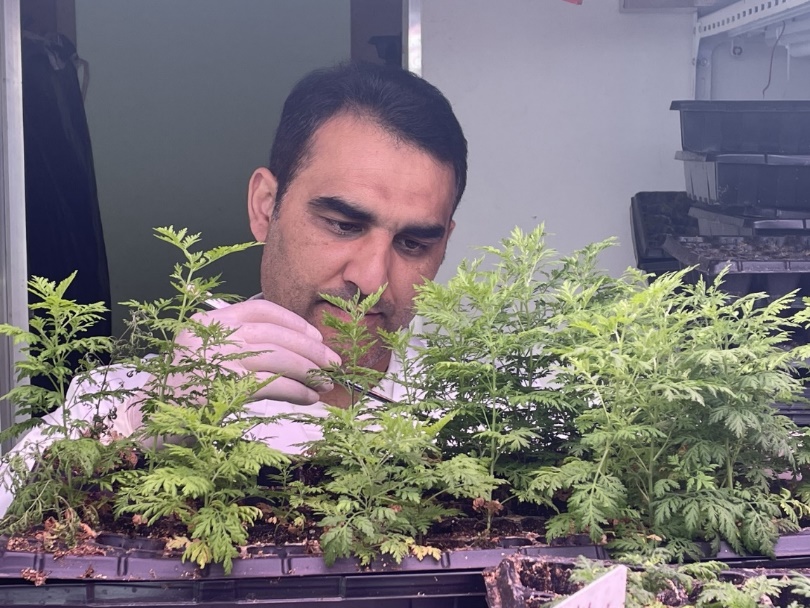Belt and Road Youth Stories | Thriving in Research Breakthroughs: An Academic Ace in Unraveling the “Genetic Code” of Artemisia annua
2023/10/19 10:32:50
Editor’s note: The Belt and Road Initiative (BRI) has opened up vast development space for the participating nations, facilitating profound growth and development. Young individuals from diverse countries have enhanced their understanding and achieved mutual success and growth through learning from each other. Their contributions demonstrate the vigor of youth in the pursuit of a shared future for mankind. This year marks the 10th anniversary of the BRI. In commemoration of this milestone, Shanghai Joao Tong University (SJTU) has launched the “Belt and Road Youth Stories” article series, recounting the endeavors of SJTU students in BRI.
Profile
Saeed ur Rahman, hailing from Pakistan, is a Ph.D. candidate at the School of Agriculture and Biology at Shanghai Jiao Tong University (SJTU). His research centers on the biosynthesis of artemisinin. During his doctoral studies, Saeed was honored with a scholarship from SJTU and joined Professor Tang Kexuan’s research team, specializing in Plant Metabolic Regulation and Metabolic Engineering. Saeed aspires to make a meaningful contribution to the global fight against malaria through his research endeavors.

Committed to Contributing to the Global Fight Against Malaria
Saeed ur Rahman, the eldest among six siblings from Pakistan, has held a deep affection for China since childhood. After obtaining his master’s degree in plant sciences at Quaid-I-Azam University, one of Pakistan’s premier educational institutions, he ventured to China to pursue his doctoral studies.
Throughout his academic journey at SJTU, Saeed is mentored by Professor Tang Kexuan from the School of Agriculture and Biology. Professor Tang Kexuan has dedicated himself to the research of medicinal plant molecular biology and biotechnology for an extensive period, where he has significantly advanced the understanding of plant natural product synthesis and regulation, particularly in the case of artemisinin. Following several years of relentless effort, Professor Tang’s research team achieved a remarkable milestone by fully sequencing more than 60,000 protein-coding genes within the traditional Chinese medicinal plant, Artemisia annua. This groundbreaking accomplishment marks the first complete decoding of the “genetic code” of this plant, offering invaluable, precise, and actionable insights for the breeding of superior Artemisia annua strains.
Under Professor Tang’s guidance, Saeed began studying the impacts of beneficial fungi on the biosynthesis of artemisinin to enhance its biosynthetic efficiency. “Artemisinin, an antimalarial compound, can significantly reduce the mortality rate of malaria patients. My research direction aims to amplify artemisinin production through biosynthesis,” notes Saeed. Upon his enrollment at SJTU, he set a goal for himself: to make a meaningful contribution to the global fight against malaria through unwavering dedication. As his research continues to advance, Saeed remains committed to working alongside Professor Tang Kexuan’s team, contributing SJTU’s wisdom to the global mission of eradicating malaria.
Achieving Personal Success Through Tireless Exploration
Pioneering scientific research is inherently demanding and calls for unwavering determination to make groundbreaking progress. Throughout his academic journey, Saeed has been surrounded by accomplished peers, all of whom have demonstrated remarkable academic insights. At times, this challenging environment has even applied a certain level of pressure. Nonetheless, Saeed sees these pressures as opportunities to elevate his academic capabilities and continually forge new paths of innovation. “My peers are all exceptional, and in such an academic environment, I quickly recognized the need to rise to their standards,” Saeed explains.
Saeed has published 7 academic articles as the first author, 9 as the second author, and 1 as a co-first author in renowned international journals. Notably, one of his recent research papers has been accepted by the Journal of Hazardous Materials (Q1 of the Chinese Academy of Sciences ranking, with an impact factor of 14.2). Serving as a peer reviewer for SCI international journals, Saeed has reviewed over 30 research and review articles and received recognition certificates from the respective journals. Saeed was awarded the SJTU International Outstanding Students for 2023 for his outstanding academic performance.

Delighting in the Pleasure of Research Breakthroughs through Unceasing Exploration
Maintaining a keen curiosity and an enduring fascination for the unknown is vital in scientific research. Saeed said, “Research is a captivating journey that allows me to delve into the mysteries of the universe and reveal its hidden marvels. It constitutes an unceasing voyage of exploration, continually pushing the boundaries of human knowledge. In this ever-evolving and changing world, persistent exploration and embracing the joy that research offers are of great importance.” One of the most appealing aspects of research is the revelation of novel phenomena, whether it pertains to unraveling the intricacies of the human brain, exploring remote galaxies, or pioneering innovative technologies. The quest for knowledge knows no bounds.
Saeed emphasized, “Every breakthrough in research serves as a gateway to new understanding, evoking feelings of reverence and astonishment that ignite our curiosity. Furthermore, scientific research requires a combination of creativity and analytical thinking. It calls upon us to think beyond established paradigms, challenge existing theories, and devise new methods to solve complex problems. Simultaneously, collaborative efforts and continuous learning are indispensable for enhancing one’s research capabilities.”
Saeed’s social circle extends beyond international students on campus, and he has forged close bonds with many Chinese students. Whenever he encounters difficulties in his academic or personal life, he actively seeks support and guidance from his friends, whose passionate responses leave him with a warm sense of belonging. “While adapting to a new environment has been a challenge, I am fortunate to have friendly and enthusiastic Chinese friends who have offered invaluable assistance at every juncture of my research. My research group mainly focuses on the metabolic regulation of artemisinin. In our day-to-day scientific inquiries, our group’s instructors and fellow students engage in discussions and debates on the obstacles they encountered during their research. They provide constructive input, offering insightful guidance in their areas of expertise. Additionally, we exchange research methods, experimental data analysis techniques, and materials, collectively advancing our research endeavors. I greatly appreciate the unity, cooperation, and diligent work ethic displayed by my Chinese peers.”
Saeed continues to delve into his research domain and intends to continue his academic journey by undertaking post-doctoral research under the guidance of Professor Tang after graduation. “I have a deep interest in my current research focus, and I like China very much. Therefore, I hope to prolong my stay in this country. I aim to continuously enhance my academic proficiency and accumulate relevant work experience. Furthermore, I want to immerse myself more profoundly in Chinese culture,” says Saeed. Despite the challenging nature of the academic endeavor, he has fully adapted to it and found genuine pleasure in it.




